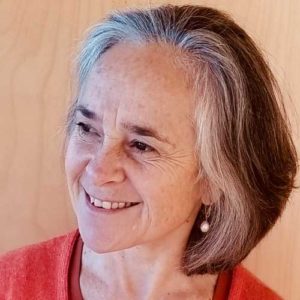Khairoon Quadir (1930-2023)
by Louie Ettling
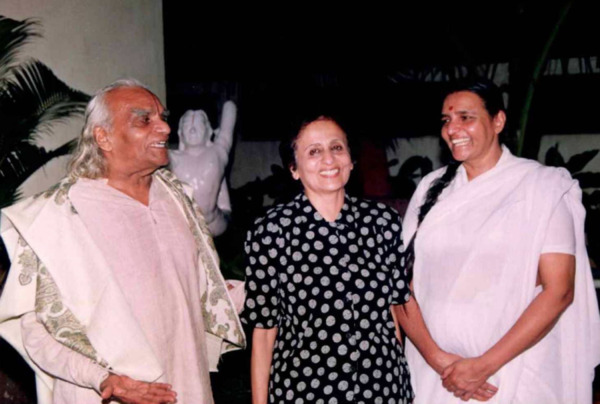
Khairoon Quadir lived to the good age of ninety three. She was a mother, a member of various culturally and philosophically diverse communities and a good friend, remembered lovingly.
Khairoon was a member of our Vancouver Iyengar yoga community since its beginnings, nearly fifty years ago. She played a key role in our association’s history. In fact one could study local Iyengar yoga history by looking at the key role Khairoon played in it.
Khairoon started yoga with the first Iyengar teachers in Vancouver; Maureen and Bruce Carruthers and Donald Moyer. Later she practiced with the next generation of teachers; Wende Davis, Ingelise Nherlan, Susan Bull and Gioia Irwin. Hilda Pezarro and Claudia Macdonald were also part of this second group of teachers. When three of us started The Yoga Space, Khairoon came to the studio opening and then attended some classes there with us, who were the third and fourth and later fifth generations of Iyengar yoga teachers in Vancouver.
Khairoon remained a dedicated student of Gioia Irwin’s. Many of us remember those deep devotional practices in the basement of Gioia’s co-op with much gratitude. Khairoon and her good friend Franca Ribatto often came to those classes together. Franca’s husband Kurt was also a good friend of Khairoon and the three of them went to retreats with Gioia and had fun warning us youngsters what it would be like to try and do yoga moves when we were in our sixties. We thought they exaggerated, until we got to be that age, of course.
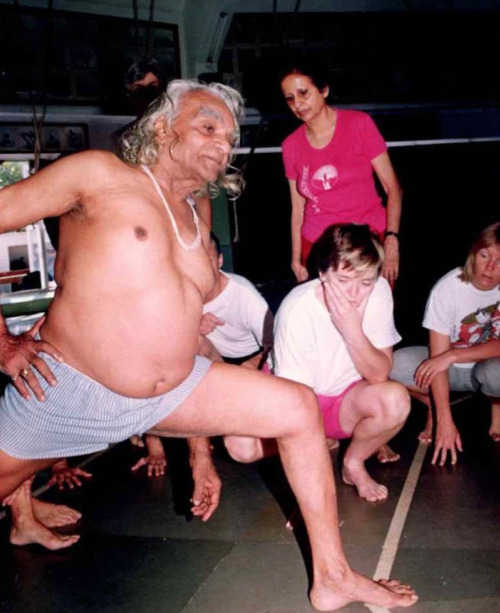
As a keen practitioner of yoga, Khairoon attended workshops with most of the teachers who were invited to teach our community since the seventies, from India, Europe, USA and various regions within Canada. A few names that come to mind from the earliest years of workshops in Vancouver are Angela Farmer, Victor van Kooten and Dona Holleman. In the eighties Shirley Daventry – French and Leslie Hogya from Victoria and Felicity Green from Lopes Island gave workshops and became friendly with Khairoon.
Khairoon was a notoriously good cook and a very gracious host. She met B.K.S Iyengar himself and cooked for him (Vancouver ’84, Edmonton ’87, Toronto ’92), as well as for Geetaji and Abhijata Iyengar, on various later occasions. Khairoon’s talents were clearly appreciated by dignitaries and locals alike. Over meals at Khairoon’s place we yoga friends deepened friendship bonds, shared life philosophies and talked about the role yoga practice played in our lives.
For Khairoon the practice of yoga was a vital part of her life. She enjoyed talking about asana practice and yoga philosophy. She asked Guruji, as B.K.S Iyengar is typically called by his student, for guidance at times. She kept two letters from B.K.S Iyengar in which he talked with her about her own practice and gave her personal advice. Her connection with the Iyengar family was meaningful to her. A photo of her and Geetaji had a place of pride in Khairoon’s home, where she lived independently until the end of her life, with solid support from her family.
Khairoon Quadir came into my life in the mid eighties when we met in a yoga class. We soon discovered that we were both born in the same town in Kenya; Eldoret, albeit almost three decades apart. We were astonished, as it was a small place in those years and we had never met anyone else who was also born there. Maybe that knowledge contributed to our bond. Over the next four decades, Khairoon and I spent time together sharing many meals, scrabble games, yoga practices and community gatherings, some of which took place when visiting teachers stayed in her home, including the male teachers from India. Khairoon called them “the boys”, partly because she met some of them when they were young boys who first came to Canada as part of Guruji’s entourage. Khairoon knew what each teacher was like, what they preferred to eat and what made them laugh. Her observational skills and memory were phenomenal. Ramanand Patel, Aadil Palkhivala, Father Joe Perreira, Birjoo Mehta, Zubin Zarthoshtimanesh, Faeq Biria, Jawahar Bangera; these are names of teachers with their own unique histories originating in the work of B.K.S Iyengar and most of them also stayed with Khairoon.
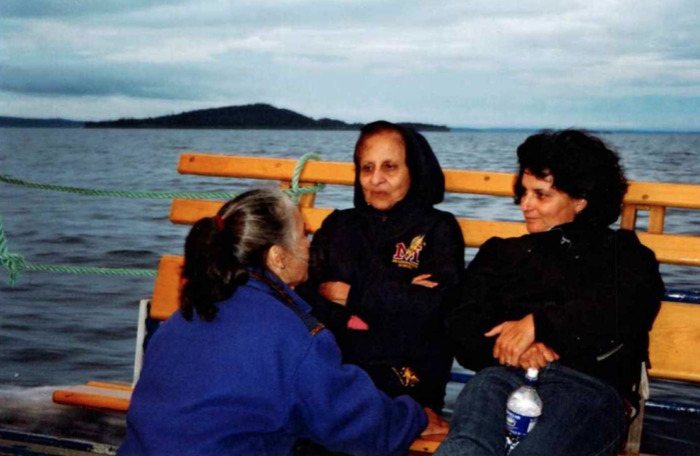
Khairoon joined me in Haida Gwaii for a retreat there. She braved the Canadian outdoors and a wobbly boat ride to a small island. All this was new to her. She shook her head at the wild kids who would just jump into the ice cold ocean. She came back touched by Haida history and art. I have a vivid memory of her on the plane back, with a mischievous smile. On her lap was a huge tray of “Tomato Joe’s” famously perfect tomatoes. She had managed to get the precious tomatoes for a good price and could not wait to cook it all up.
Khairoon made friends easily and she often stayed connected with these guests. Gabriella Giubillaro from Italy taught us in Vancouver regularly over a good fifteen years (before COVID) and Khairoon and she got along well. They took turns chasing the other one out of the kitchen, but Khairoon always won that game. Khairoon got along with such diverse characters who all appreciated her unique bright gaze and fiery passions, especially when she talked about the teachings of Jidda Krishnamurti and the importance of yoga practice to deal with one’s nervous system and general health.
Khairoon went to Metchosin on Vancouver island a few times to cook for groups attending retreats at the Krishnamurti Centre there and she even prepared meals for Krishnamurti himself. Until the end of her life Khairoon listened to tapes of his work and liked to quote him from her spot on the couch, with her cat Pixie curled up on the rocking chair. “The cat listens too”, she joked. One quote she particularly mentioned on a few occasions is; “The more you know yourself, the more clarity there is. Self-knowledge has no end – you don’t achieve, you don’t come to a conclusion. It is an endless river”.
Outside of her family and cultural community life and her yoga activities, Khairoon was a formidable bridge player. She played very regularly until the end of her life. During the last year or two she played from home, on her phone. She also enjoyed scrabble and other word games. Sometimes she would invite me over for a scrabble-sleep over. That meant playing a few rounds of scrabble, while watching Hindi soap operas and eating home made mango Kulfi. In the morning Khairoon would insist on good strong sweet black tea before one could depart. She always, always, had to give one food for the road. It was difficult to give Khairoon gifts (“no, don’t go waste your money!”) and even more difficult to depart from her home without gifts (“come on, you will get hungry!”). One could not win, as one always won.
When Khairoon met my mother, who was 90 at the time, she treated my mother as she did so many of us; like a family member who came to her for a visit. Khairoon talked about how she came to Canada with her three daughters Anisa, Aleeta and Ruhina and how hard she worked to make a life for them all. These two dedicated mothers nodded knowingly, as parents would who know what sacrifices such a huge transition would require. They both described this meeting to me in very positive ways, for years afterwards.
About eighteen years ago Khairoon and I put a small cookbook together with her recipes. It was the second such booklet. The first one came out of a cooking course she had been asked to teach in Alaska. She had also given her Victoria yoga friends an Indian cooking class, in Ann Kilbertus’ home. Putting the little cookbook together in Vancouver was a bit like participating in these cooking sessions with Khairoon. The details were hard to pin down. “No, I said little, but I did not mean that little!” Or “No, I said enough, but I did not mean that much!”. One had to be there to experience her ease in throwing handfuls of spices into her pots. In the end, she said, it was the love that made the food so good. It was certainly love, but it was also a lifetime of experience.
Khairoon identified strongly with her Muslim and Indian cultures. For her hospitality, generosity and the gift of sharing food was grounded in her culture and was also who she felt herself to be by nature. It was a bit of a battle to even wash a dish for her. This changed during the last couple of years. The first time Khairoon allowed me to just go into the kitchen and to start washing up it was almost startling. Finally Khairoon decided that her middle daughter, Aleeta, could “inherit the cooking”. She taught Aleeta, even praised her cooking and let her take over the famously good “Khairoon lime pickle” production. One jar of that perfumed, potent pickle is like gold. It was touching to see how Khairoon eventually accepted being cooked for and to see how appreciative she was of being the one who could receive “her” meals in her own home.
Anisa, Ruhina and Aleeta, were accepting of Khairoon’s “yoga family”. It must have taken some willingness to always share their mother with the rest of us. Aleeta included us in communications about Khairoon’s well-being until the very end of Khairoon’s life. We are grateful for this generosity.
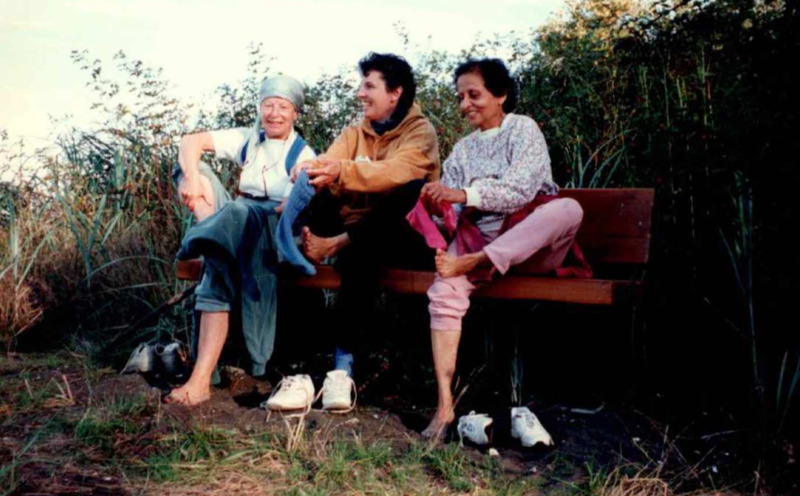
Two of Khairoon’s longtime yoga friends, Susan Sutherland and Helen Smith were able to represent the “yoga family”, both at the service held at the Mosque and at the burial itself. As Susan describes these touching gatherings, it was clear that Khairoon left a strong impression on those she met. Friendly people at the mosque remembered Khairoon teaching them yoga, with broad smiles. Even at the Buddhist temple, where prayers were said for Khairoon (Aleeta and her husband Gordon have been dedicated practitioners there), the monks remembered Khairoon’s openness when she had visited.
Khairoon could straddle what others might perceive to be different worlds, because she knew from her own experience that we could expand ourselves by following our instincts, while honouring community. Khairoon knew that the truth lies beyond the first label and the second. She said that she felt, as Krishnamurti did, that “.…limited thought, limited inquiry can never put, understand, or grasp the immense significance of that which is immense, immeasurable.”
Khairoon was inspired by very practical daily implementations of philosophical explorations and offered such food for thought. She wanted others to “get it”. Her inquisitive, smart and caring nature was engaging and her friendship unique. As Helen Smith puts it; “Khairoon was a special person and fun to be with …We loved her chi and we loved her”
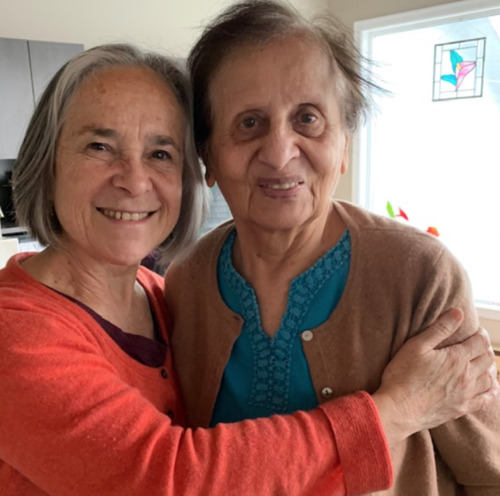
A dedication to Khairoon Quadir, contributed by Louie Ettling.
